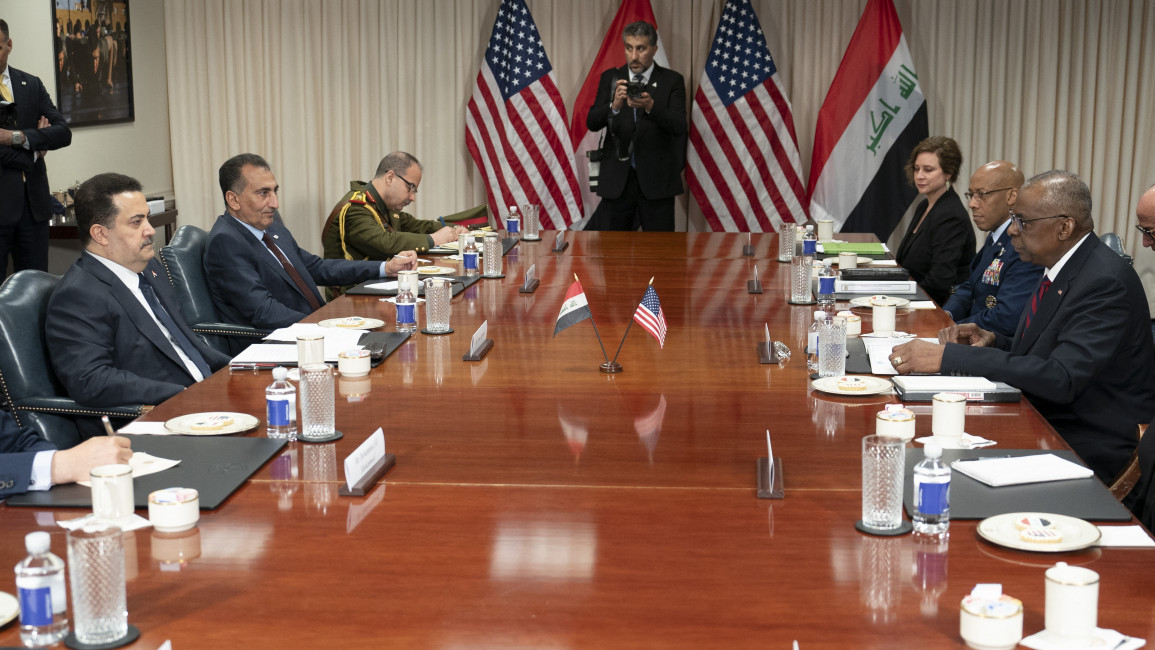US and Iraq affirm security partnership, as coalition troops exit plan to be evaluated in July
In Monday's first meeting between United States President Joe Biden and Iraqi Prime Minister Mohammed Shia al-Sudani, both leaders underscored their dedication to a stable and secure Iraq, signalling that US forces will continue to operate within the country for the foreseeable future.
Sudani, whose government relies on the support of Iran-aligned parties, has repeatedly said he would like to see the US-led international anti-jihadist coalition depart his country amid soaring regional tensions over Israel's deadly war in Gaza.
Sudani, during a televised event at the World Economic Forum in Davos, Switzerland, in January, said the withdrawal is "a necessity for the security and stability of Iraq".
However, the US sees it is not yet time for its forces to withdraw from Iraq, citing the incapability of Iraq's security forces and the threat of ISIS resurgence.
Biden and Sudani emphasised the importance of Iraq's security forces in preventing the resurgence of ISIS within Iraqi borders.
According to a joint statement following the meeting, they agreed that Iraq's security apparatus must remain robust to safeguard the nation, the region, and international interests, including those of the US.
President Biden reiterated his conviction that a strong and self-defensive Iraq is pivotal in maintaining regional stability. He pledged to enhance the capabilities of Iraqi security forces throughout the country to protect its people and territory.
Sudani chaired the initial round of meetings of the US-Iraq Higher Military Commission in late January, focusing on reviewing the mission of the US-led international coalition against ISIS. While Baghdad anticipated a withdrawal timeline, US officials clarified that the talks do not involve an immediate withdrawal.
"The two leaders expressed their commitment to the ongoing Higher Military Commission (HMC) process and its results, and the three working groups that will assess: the continued threat from ISIS, operational and environmental requirements, and bolstering Iraq's security force capabilities," reads another part of the joint statement. "The two leaders affirmed they would review these factors to determine when and how the mission of the Global Coalition in Iraq would end and transition in an orderly manner to enduring bilateral security partnerships, in accordance with Iraq's Constitution and the US-Iraq Strategic Framework Agreement."
They also confirmed plans to hold the US-Iraq Joint Security Cooperation Dialogue (JSCD) later this year to discuss the future of their bilateral security partnership.
In a statement on Monday, the Iraqi Prime Minister's office announced that Sudani visited the US Department of Defense in Washington, where he met with Defence Secretary Lloyd Austin. Sudani emphasised Iraq's commitment to maintaining relations with the United States and acknowledged the sacrifices made in the fight against ISIS over the past decade.
The Prime Minister emphasised that Iraq's security forces are currently well-prepared. He confirmed initiating efforts to establish a partnership through the High Coordinating Committee. This committee will evaluate the military situation, assess ISIS risks, and propose a timeline for ending the coalition's mission. The second meeting of this committee is scheduled for next July to enhance bilateral cooperation further, aligning with the Iraqi constitution and the US-Iraq Strategic Framework Agreement.
Sudani expressed Iraq's keen interest in bolstering its security capabilities and partnership with the US to maintain regional stability.
Austin welcomed this commitment, highlighting the strength of the ongoing partnership and the US's support for Iraq's counterterrorism efforts. They both emphasised the importance of dialogue in forging a strategic relationship within the framework of their bilateral agreement.
Since Israel initiated its war on Gaza last October, the Islamic Resistance in Iraq, a coalition of Iranian-backed militias, has conducted attacks on bases hosting US forces in Iraq and Syria. The group asserts that these strikes are retaliatory measures against Washington's backing of Israel during the Gaza conflict and aims to pressure the withdrawal of US troops from Iraq.
The US has retaliated by launching airstrikes on bases of Iran-backed militias organised within the Popular Mobilisation Forces (PMF) that have been formally incorporated into the Iraqi security forces. The airstrikes have killed tens of militia leaders.
US-led forces entered Iraq in 2003, overthrowing former dictator Saddam Hussein in a war that is widely considered illegal. After withdrawing in 2011, they returned in 2014 to combat the Islamic State (IS) group as part of an international coalition. Presently, the US maintains approximately 2,500 troops in Iraq who are assisting and advising the Iraqi security forces on fighting ISIS.
Following the territorial defeat of IS in 2017 and its subsequent decline, Sudani argued that the coalition's original purpose had long been fulfilled.



